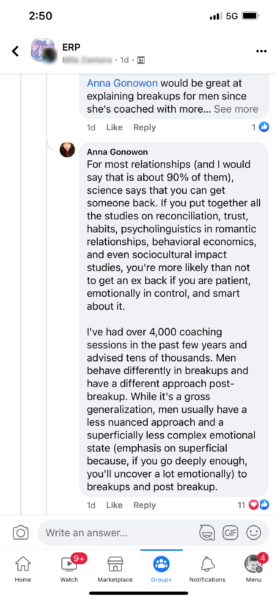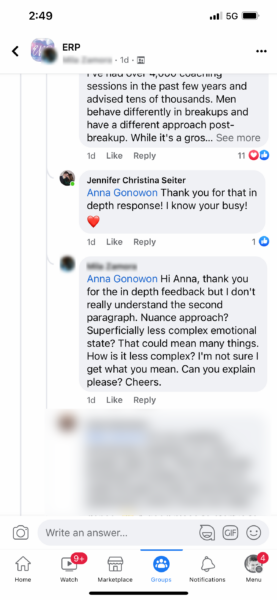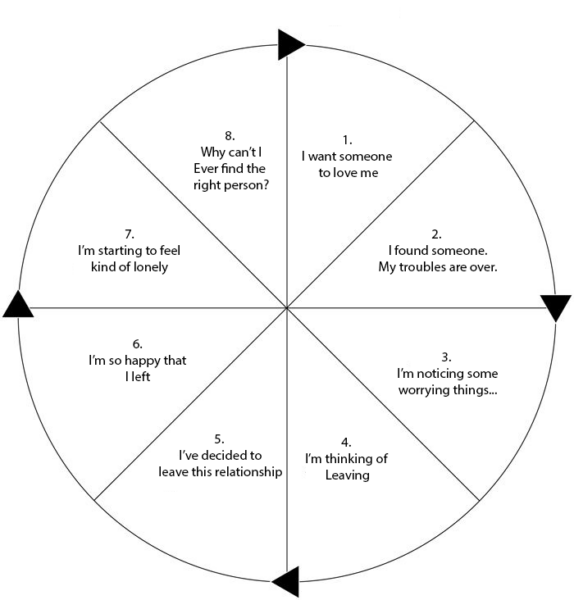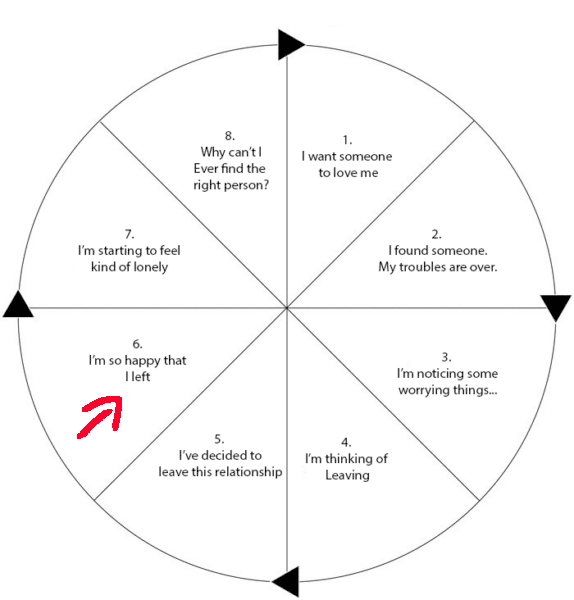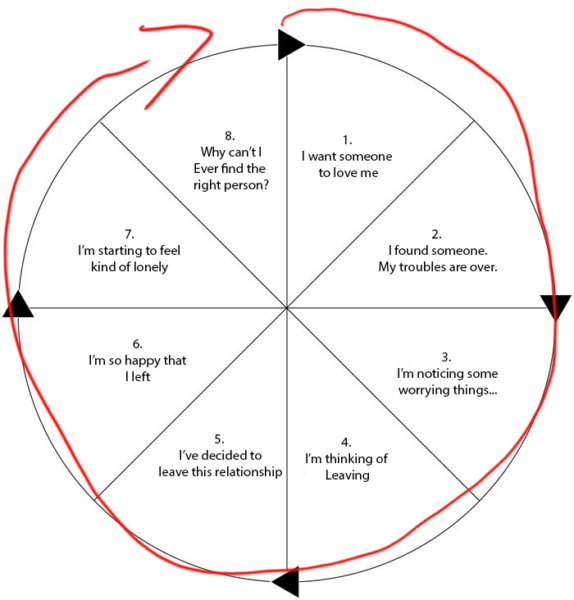Today we’re going to talk about why dumpers always seem to be so happy after a breakup.
But really I’m going to make a case that they aren’t as happy as they seem.
Really this article was inspired by a comment we got in our private Facebook support group that elicited this response from our head coach, Anna Gonowon.
It’s going to serve as the crux of the argument I’m going to make today as there was quite a bit of confusion on how to interpret it.
Let’s get started.
Why The Dumper Isn’t Always As Happy As They Seem
Let’s start first by doing a deep dive into our audience.
- 63% of the people reading this article are most likely going to identify as female.
- 90% of them will be the “dumpee.”
- And as evidenced by this poll, close to 70% of their exes are going to be thought to have avoidant tendencies.
And that’s the first big thing I’d like to take a look at.
According to our very own Coach Tyler Ramsey, the avoidant attachment style is a person that does not like a lot of emotional intimacy or vulnerability within a relationship. They typically revert a conversation back to someone else to talk about themselves to avoid the spotlight. Often that’s how you’ll figure out if they’re avoidant or not. Ultimately they are afraid of having a deeper emotional connection and it all can stem from their experience in childhood. They’ve learned that any time they are vulnerable, it can be used against them and therefore they don’t rely on other people.
One of the things that I put together that has been garnering a lot of attention lately is this handy graphic,
I call it the avoidant self fulfilling cycle as it pretty much demonstrates how avoidant individuals are caught in the same cycle when it comes to relationships.
There are eight stages to it.
- They start out wanting someone to love them
- They date you and things are great at first
- Eventually your need for open communication and intimacy triggers their avoidant side
- They begin to consider leaving the relationship
- They actually leave the relationship
- They are ecstatic that they left the relationship
- They begin to feel lonely and need to find a distraction for the loss
- They enter victim mentality and wonder why this is always happening to them
So, what I’d really like to take a look at here are stages six through eight.
For reference those stages are,
- They are ecstatic that they left the relationship
- Then then begin to feel lonely
- Then they end up back to where they started
The natural assumption is that the dumper is always happy after a breakup and if that dumper is a dismissive avoidant then that certainly is going to be the case.
However, it’s important to understand that the euphoric feeling they are feeling after a breakup has nothing to do with you.
I realize that may be an odd thing to hear me say but it’s more about a reclamation of freedom.
We know that individuality and freedom are among the most valued traits to avoidants and for them, especially if they are in a relationship with an anxious individual, it can feel as if they’re losing those traits.
So, when they break up with you to them it feels like they’re getting those things back.
It sucks for you but feels great for them.

What Are Your Chances of Getting Your Ex Boyfriend Back?
Take the quizBut that euphoric feeling is fleeting. Eventually they begin to feel lonely and start seeking other individuals (including you) to fill the void.
They’re constantly caught in this cycle of always wanting more but never being satisfied.
I’m not going to go as far as saying that the happiness they exhibit after they break up with you is a front. I don’t think that’s an accurate way to describe it. Rather, it’s authentic for the moment but their grief simply hasn’t hit yet.
That takes time.
Which leads me to my next point.
But My Dumper Seems So Happy Because They Moved On To Someone Else
I’d like you to refer to this graphic again,
Again, let’s point at stages six through eight.
After that rush of getting that freedom back wears off disappointment kicks in.
Loneliness kicks in.
After all, a big misconception people have about avoidants is that they like to be alone. That’s not technically true.
Yes, they feel comfortable being alone a lot of the time but that doesn’t mean they don’t want companionship.
Rather, they just want companionship on their terms. According to Free to Attach,
They prefer relationships in the early stages (“honeymoon period”), where they are at their best and most happy being open and sharing, while there is a measure of distance, partners are not leaning on them and no one’s flaws are very visible. As soon as there is a necessity for extra closeness they start to panic, feel guilty and close off the closer they get, backing away when it moves to a level of intimacy that requires conflict resolution and vulnerability.
They start to crave that again and often look to others to fill the void. I also personally believe there’s a coping mechanism at play here.
Rather, than do the “shadow work” of looking back at your relationship and time together they would prefer to distract themselves with someone else.
Grief hits hard and if you think about their “M.O.” It’s all born from a deep seated fear of becoming too vulnerable and losing themselves.
The last thing they want to do is sit there and feel the grief of the breakup. So, they’ve found their coping mechanism as distraction via another relationship.
Which seems like an odd thing for an avoidant to engage in. After all, aren’t they supposed to avoid things?
Well, in a way they are. They are just using someone else to do it.
Interesting Insight We’ve Learned About Men Dumpers Compared To Women Dumpers
I can’t really take credit for this one as our very own Coach Anna definitely was at the forefront of these insights.
The following is taken directly from a post she made in our private facebook support group. It might be the best thing I’ve ever read on explaining breakup behaviors.
(Side Note: I got her permission to use it which is why this article is written by both me and her. Thanks Anna! You’re the best.)

What Are Your Chances of Getting Your Ex Boyfriend Back?
Take the quizThere was a survey of studies regarding breakup behavior across 96 countries, and the survey found that when it comes to breaking up no one emerges completely unscathed.
When graded on a scale, men, on average, did feel less pain than women after a breakup – both emotional and physical. It’s not necessarily because the men were less into their partner.
Rather, it’s an evolutionary biological response, because when it comes to mating women had more to lose.
From a biological perspective, women bear the larger minimum parental investment – nine months of gestation as well as the metabolic costs of lactation. Therefore, women tend to be more selective in their mating choices.
This selection process tends to be more well-thought out for a woman because she is either consciously or subconsciously planning for a long term commitment.
That’s why for many of our clients (remember most of our clients are female) feel like it’s the end of the world when the mate they selected elides they don’t actually want you at all.
Men feel bummed, though, and they express it too. In that same study men reported more feelings of anger and they tend to engage in more self destructive behaviors than women. Women in comparison, frequently feel more depressed and participate in more social, affiliative behaviors than men. Women’s behaviors could be argued to be more constructive strategies as a result of their tendency to preserve the relationship whereas men choose destructive strategies for maintaining their own self esteem.
These so called “constructive strategies” can include,
- Over analyzing the relationship
- Searching online (for websites like this)
- Joining our private facebook support group
- You get the idea
There was a piece in the Atlantic, about how many of us try to figure out what went wrong in the relationship. It’s very normal, and this narrative or storytelling behavior can be positive, helping people make sense of and come to terms with painful things that happen. The stories we tell ourselves about rejection can shape how, and how well, we cope with it.
In a 2011 study, it was found that women tend to lose more self-esteem after a breakup (twice as much as men), but they were almost always able to identify a silver lining of increased personal awareness and greater perceptivity regarding future relationships.
Moreover, this coping mechanism helps women recover more fully and emerge emotionally stronger than men. This is why it is important, if you are trying to get a woman back, you successfully complete a No Contact the first time around and you start the No Contact as quickly and calmly as possible. Women are more likely to process the breakup and move forward and onto new emotionally intimate relationships.
However, as ERP demonstrates, women more obviously hold onto the hope that reconciliation is on the horizon.
Interestingly, this type of self-reflection is atypical for guys; ERP men appear to be more of the exception, clearly. Men usually have a different approach to dealing with their feelings.
I read a psychiatrist once describe it as “Men tend to repress their grieving and take a ‘fake it until you make it’ approach…some men become dogs and go for every hookup…but they are terrified of intimacy and run like hell if a woman wants anything more. Alternatively, they party with their guy friends to drown their sorrow or bury themselves in their career or their hobbies—anything to keep their mind off their loss and their pain.”
This might make you reconsider the sudden onslaught of happy posts on your ex’s social media or the sudden appearance on dating apps. The truth is that it typically takes men longer to get over a breakup than women. Research has shown that it can take some men years—or even decades…if they truly loved you. They just don’t show their grief to others—or even to themselves.
Because many men are not socioculturally taught how to properly deal with their emotions, they don’t know what to do with them when they suddenly arise. The tricky part is that men are raised to hide their feelings and to not let you know if you hurt them—the worse the pain, the more they have to hide it.
This lack of emotional development hinders relationships in other ways, including preventing men from connecting or being vulnerable with their partners on a deeper level. This attitude makes men value relationships as “accomplishments” instead of as meaningful partnerships.
As a result, while they may mourn the loss of the relationship, it is more about a failure versus a loss of a person.
Their detachment also helps men “move on to the next [relationship] more quickly.” And ostensibly, continue this vicious cycle again.
Biology plays a role in expediting breakup pain for men. When a man enters a new relationship, his testosterone levels drops, making him more susceptible to bonding with oxytocin (a.k.a. the hormone that makes you feel love). But once he decides to exit the relationship, his testosterone goes back up, reducing the effect of the oxytocin: He literally stops feeling love. In other words, when he’s done, he’s done, because his body helps him to disconnect.
So maybe the real story should go something like this:
- Boy and girl meet.
- Boy tells girl he loves her.
- There is no one else but her.
- But then, at some point, boy says, “It’s not you, it’s me. Let’s be friends.”
- The boy changes his Facebook status to “single” and fills his Instagram feed with photos of himself partying with never-before-seen women.
- The girl, meanwhile, falls apart and tells her friends how unfair it is that he’s already over the relationship, while she’s busy analyzing every minuscule thing that she might have done wrong, for months, maybe even years.
But the boy falls apart, too—he just doesn’t show or tell anyone. - It sucks for both boy and girl, just in different ways.
- And it probably sucks even more for him, but he’ll never tell you, because he’s not allowed to.
Overall, you have to continue taking a marketing/PR approach to interactions with your ex — you’re rebranding yourself and a relationship with you. You have to keep trying and chipping away at it, as well as working on your Trinity, adding new and exciting experiences, speaking with your therapist, and coming to the group for relationship support.

